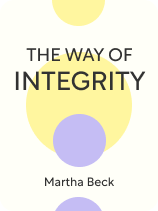

This article is an excerpt from the Shortform book guide to "The Way of Integrity" by Martha Beck. Shortform has the world's best summaries and analyses of books you should be reading.
Like this article? Sign up for a free trial here.
When it comes to being true to yourself, what role do habits play? What price do you pay for living with integrity?
Martha Beck shares five techniques for being true to yourself in her book The Way of Integrity. She discusses committing to telling the truth, focusing on making small adjustments, focusing on your yearning, enjoying the benefits of integrity, and forgiving yourself for violating your integrity.
Continue reading for Beck’s five-part advice on how to live with integrity.
How to Live With Integrity
Once you free yourself from false beliefs and understand your inner truths, you can begin aligning your life with these truths. This is going to be challenging at first because you will be acting against your habits. However, it will get easier as you make it into a way of life. Here’s Beck’s advice on how to live with integrity.
1) Commit to Telling the Truth
When you live in your false beliefs internalized from your culture, you are not just lying to yourself—you also have to lie to family, friends, and colleagues. Living your truth will require telling it to others and making them understand who you really are. You may risk losing the identity you have built for yourself as well as your social relationships. However, Beck argues this may be the price you have to pay for living with integrity.
She cautions you to expect pushback, especially if living your truth requires violating the rules of your culture. For example, if you belong to a community that expects everyone to follow traditional gender roles, coming out as transgender may result in ostracization, social pressure, and outright hostility, even if your nature tells you this is who you really are.
| How to Manage Public Backlash Beck cautions that being yourself in public may lead to intense backlash from your culture. In So You’ve Been Publicly Shamed, journalist Ron Jonson suggests four strategies for managing intense public backlash, based on his interviews of people who have been ostracized and attacked online. 1. Tell your own story. When facing public backlash, your detractors may try to tell a negative story about you to the public. Get out in front of the damage by telling your own version of the story. 2. Wait it out. Sometimes public backlash will blow over as it becomes old news and your detractors move on to other targets. However, this is a risky strategy, as you might not be able to repair your reputation when returning to your public life. But it has worked for some people. 3. Develop emotional resilience to shame. Refuse to feel ashamed of the things others think you ought to be ashamed of. This will take away your detractors’ ability to harm your emotional well-being. 4. Hire a reputation management company. While not everyone can afford these services, reputation management companies can help you by creating new online content that will knock damaging online content out of the first page of search results. This will prevent negative content from becoming your entire public image. |
2) Focus on Making Small Adjustments
Beck also encourages you to realign your life by changing one small thing at a time. She stresses that aligning your life with your inner truth may take a long time and a lot of work, and you can’t expect to achieve all of it at once. However, small changes will add up over time to create a life where you are free to be yourself and live out your true nature.
For example, if you live in a big city, but deep down you want to spend more time in nature, you don’t have to start by uprooting your entire life and moving to the country. You could try planning a camping trip, or going on regular walks in a park.
| How to Form Habits Making small adjustments in your life leads to much larger improvements over time only if you can turn those small adjustments into habits. As James Clear explains in Atomic Habits, each new habit you create becomes the foundation on which to build the next positive habit. Therefore, in changing your life through small adjustments, it helps to understand how to form an activity into a habit. Clear identifies four stages of developing habits. 1. The cue triggers your brain to notice an opportunity to do something. 2. The craving is the emotional response attached to a certain cue—your emotional desire to do something. 3. The response is how you act to fulfill the craving. 4. The reward is the satisfaction you gain from the action you took. In deciding on a positive step that you would like to turn into a habit, try writing out your new habit with each of these four steps. |
3) Focus on Your Yearning
Beck explains that, if you find yourself stuck while trying to get your life in alignment, it helps to focus on your deepest yearning. This yearning comes from your personal nature and tells you what you want to be doing with your life. It also provides the motivation you need to make hard changes like telling the truth with high social risks or making consistent small changes to realign your life. Beck also argues that you can’t force yourself to make hard changes until you are ready—but getting in touch with your yearning will bring you closer to readiness.
(Shortform note: In learning to listen to your yearning, it’s helpful to draw a distinction between yearnings and cravings. Cravings are short-term desires that, when fulfilled, are quickly replaced with other cravings. Yearnings are long-term desires felt more deeply and can guide your life in accordance with your personal nature. However, it can be difficult to tell them apart while you are in a state of craving. Psychologists, therefore, suggest that you can reduce your experience of cravings through mindfulness and meditation. If you calm your mind and free yourself of cravings, you will have an easier time listening to that underlying yearning that motivates you toward a better life.)
4) Enjoy the Benefits of Integrity
As you get closer to realignment, you will begin to feel more at peace with yourself. Recall the three pieces of alignment: Accept your personal knowledge, accept your feelings, and spend your time on what you love. As you make this your practice, you will experience a greater sense of wholeness and well-being. Learning to love and enjoy this lifestyle will provide further motivation to continue the difficult process of realignment.
(Shortform note: In making important life changes, motivational experts stress the importance of reinforcing a change to make it stick. In Switch, Chip and Dan Heath argue that celebrating progress—no matter how small—can bolster your motivation to continue making the change. Therefore, by taking the time to savor even small moments of feeling aligned, you can strengthen your resolve to keep going.)
5) Forgive Yourself for Violating Your Integrity
Finally, as you get your life in alignment with your deepest nature, Beck highlights the importance of forgiving yourself for falling out of alignment with your integrity. Many people devote years of their lives to living out false beliefs and may be tempted to beat themselves up for their mistakes. Beck argues that the best thing you can do is let go of the past while forgiving yourself for the false beliefs you internalized from your culture.
| The Five Steps of Self-Forgiveness 1. If you’re struggling to forgive yourself for living against your integrity, psychologists recommend five steps. 2. Own what you have done. Accept accountability for your actions and their consequences. 3. Understand why you lived outside of your integrity. Look back on your past actions with honesty and compassion and determine the need you were trying to fulfill. 4. Learn from your mistakes. Think about the lessons you can apply and make a plan for your future. 5. Make amends. Try to set things right with those who have harmed when living outside of your integrity. 6. Choose to forgive yourself. Make a conscious decision to let go of your guilt moving forward. |

———End of Preview———
Like what you just read? Read the rest of the world's best book summary and analysis of Martha Beck's "The Way of Integrity" at Shortform.
Here's what you'll find in our full The Way of Integrity summary:
- How to know if you're living in alignment with your true self
- How messages from our culture tell us to chase things we don't really want
- The four stages of realigning your life to find happiness






